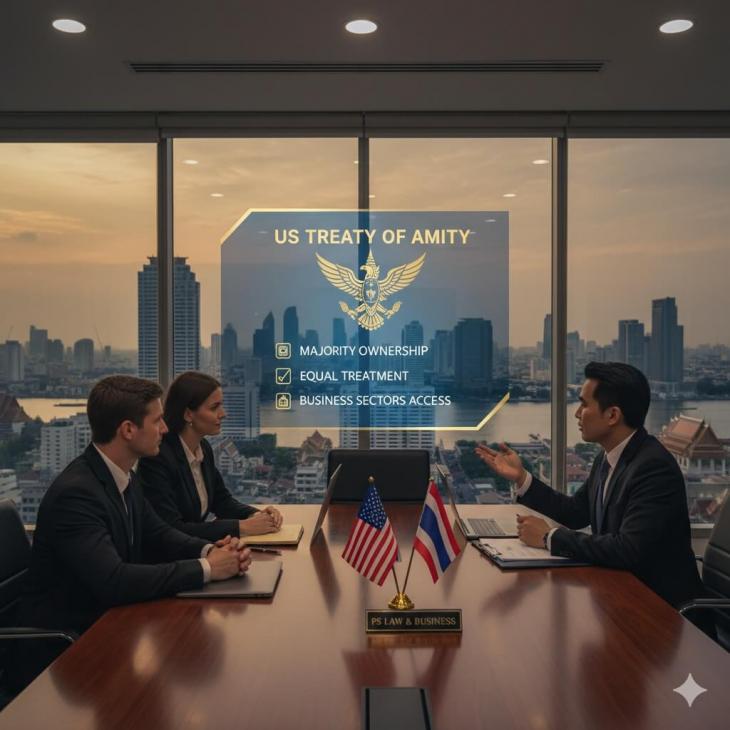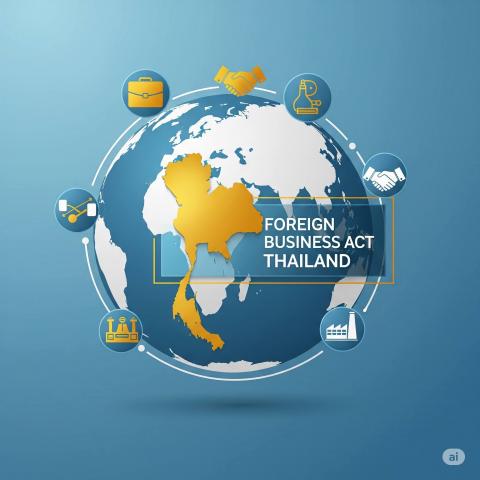Unlock 100% American Ownership of Your Business in Thailand
For American entrepreneurs and corporations, Thailand offers a unique and powerful investment privilege found nowhere else: the US-Thai Treaty of Amity and Economic Relations. While most foreign investors are restricted to owning only 49% of a company under the Foreign Business Act, this bilateral treaty allows US citizens to own and control 100% of their business in Thailand.
At PS Law & Business, we specialize in helping American investors navigate the specific regulatory requirements to secure "Amity Treaty" status, ensuring your business is fully compliant and completely yours.
What is the US Treaty of Amity?
Signed in 1966, the Treaty of Amity grants American individuals and companies "national treatment." This means your business is treated legally as if it were a Thai company, bypassing many of the restrictions placed on other foreign entities. The primary advantage is the exemption from the foreign majority ownership limit, allowing you to hold 100% of the shares without needing a Thai partner.
Key Benefits for American Investors
- 100% Foreign Ownership: You do not need to find a Thai nominee or partner. You retain full control of your company's direction and profits.
- Exemption from Foreign Business License (FBL): While you still need a certificate, the process is generally more streamlined than applying for a full Foreign Business License, which is discretionary and harder to obtain for non-US nationals.
- Equal Protection: Your company receives the same legal protections as Thai companies, including protection against nationalization.
Eligibility Requirements
To qualify for protection under the Treaty of Amity, your business structure must strictly adhere to the following criteria:
| Requirement | Detail |
|---|---|
| Shareholding | At least 51% of the shares must be held by US citizens or US business entities. |
| Directorship | A majority (more than 50%) of the directors must be US citizens. |
| Signatory Power | The authorized director(s) with binding power must be US citizens. If a third-country national is a director, they must co-sign with a US director. |
| Minimum Capital | Generally, 3 million THB is recommended to comply with Foreign Business Act regulations for restricted businesses, though 2 million THB applies to non-restricted activities. |
The Registration Process
Obtaining Amity Treaty status is a multi-step legal process that requires coordination between the US Embassy and the Thai Ministry of Commerce. We handle this entire workflow for you:
- Company Formation: We assist with the standard Thai Limited Company registration, ensuring the Articles of Association and shareholding structure meet Treaty requirements.
- US Embassy Certification: We apply for a "Certificate of Eligibility" from the US Commercial Service at the US Embassy in Bangkok. This proves your American nationality and qualification.
- MOC Certification: Once certified by the Embassy, we apply for the Foreign Business Certificate (FBC) from the Thai Department of Business Development (DBD). This is the official document that legalizes your 100% ownership.
Restricted Activities
While the Treaty is powerful, it does not cover every industry. The following activities remain reserved for Thai nationals and are excluded from Treaty protection:
- Owning land (You may still buy condominiums).
- Communications (Telecommunications, Radio, Broadcasting).
- Transportation (Domestic land, water, or air transport).
- Fiduciary functions (Trusteeship).
- Banking involving depository functions.
- Exploitation of natural resources.
- Domestic trade in indigenous agricultural products.
If your business falls into these categories, we can advise you on alternative structures, such as Board of Investment (BOI) promotion, which may still offer ownership incentives.
FAQ
Can I buy land under the Treaty of Amity?
No. The Treaty of Amity grants 100% ownership of the business entity, but it explicitly excludes the right to own land. You can, however, own the building structure or enter into long-term leases.
How long does the process take?
The entire process, from company registration to obtaining the final Foreign Business Certificate, typically takes between 6 to 12 weeks, depending on document readiness and government processing times.
Do I still need a Work Permit?
Yes. The Treaty covers company ownership, not individual employment rights. All foreign employees, including the US directors, must obtain a valid Work Permit to work legally in Thailand.
Is there a minimum capital requirement?
Yes. While the standard Thai company minimum is often lower, Amity Treaty companies operating under the Foreign Business Act usually require a minimum registered capital of 3 million THB.




